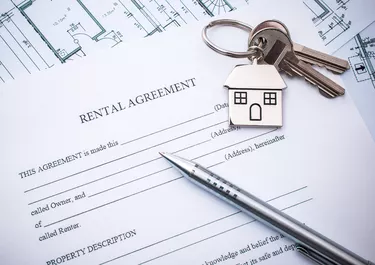
A rental lease is a legally binding contract. Once you sign, it's difficult to back out of the agreement. State laws usually have no provisions allowing for a 24-hour cooling-off period which allows you to void the agreement with no additional penalty should you decide to change your mind for whatever reason. It's important you consider all your options and read your lease agreement thoroughly to avoid entering into a contract you can't afford.
Read More: What Does it Mean to Lease a Home?
Video of the Day
Video of the Day
No Lease Cooling-off Period
Landlord-tenant laws usually do not afford a "cooling-off" period where you can back out of a lease agreement without penalty. The Federal Trade Commission does have a law allowing a 72-hour cooling-off period for a retail sale of $25 or more, but this does not apply to a rental lease agreement. Once you sign a lease agreement, it is legally binding. Your landlord is well within his rights to force you to comply with the lease agreement including suing you in civil court for breaking the agreement if you choose not to pay monthly rent in accordance with the lease's rules. This could leave you with an eviction notation on your credit report which can severely damage your chances of renting another apartment or other residential rental property.
Never Taking Possession
You may attempt to cancel a lease agreement by never taking possession of the rental property. Your landlord doesn't have much incentive to enact eviction proceedings since no one is living in the rental unit and must usually attempt to re-rent the property. The laws in some states may allow the landlord to sue you for rent owed on the lease agreement but only up until the point a new tenant moves in. The landlord must make good faith efforts to re-rent the property. If you never take possession of the property, state laws may allow a landlord to keep your security deposit as compensation.
Termination by Mutual Agreement
A landlord may agree to allow you out of a lease agreement if you can show her extenuating circumstances which will not allow you to take possession of the property. These circumstances can include a sudden layoff or unexpected job transfer that takes you to another state or even out of the country. You should get something in writing saying your landlord agrees to terminate the lease by mutual agreement and have the document notarized. Having something in writing will help to protect you in the event the landlord attempts to sue you for the balance of a lease he supposedly terminated.
Read More: Standard House Rental Agreement
Illegal Lease Terms
The terms of your lease agreement may allow you to break or cancel the lease if your landlord includes clauses that violate existing landlord-tenant laws. These include provisions that remove the landlord's obligation to maintain the property and allow her to enter the rental property without your prior consent. The landlord is unable to sue you to legally enforce such an agreement because the illegal lease provisions void the lease agreement. Be sure to familiarize yourself with the laws governing your lease location to ensure you're covered in this event.